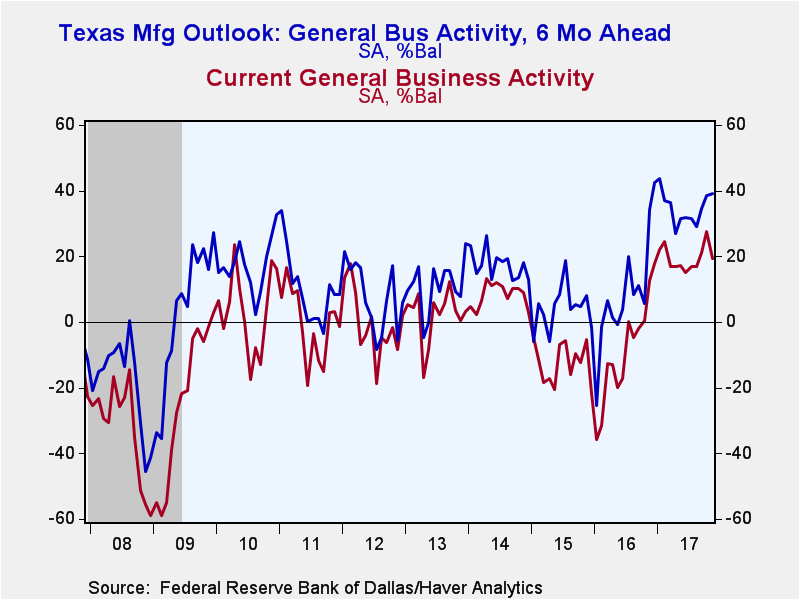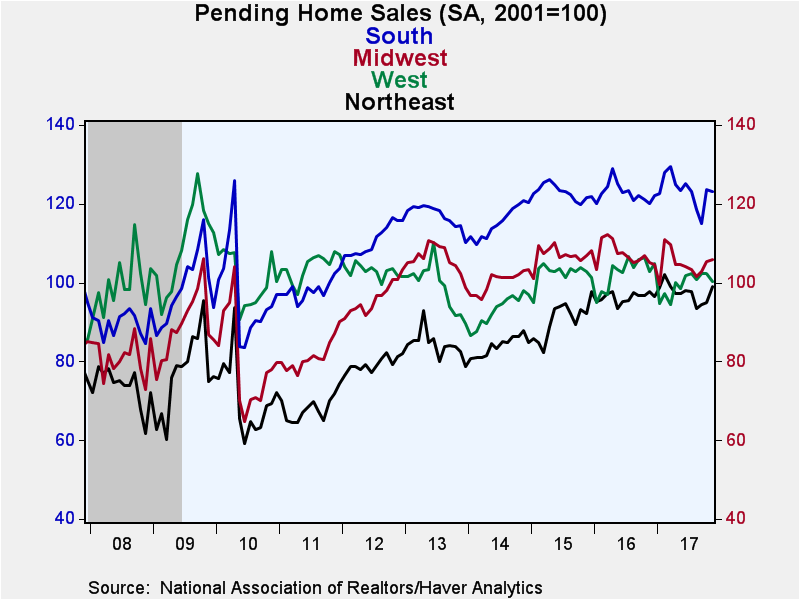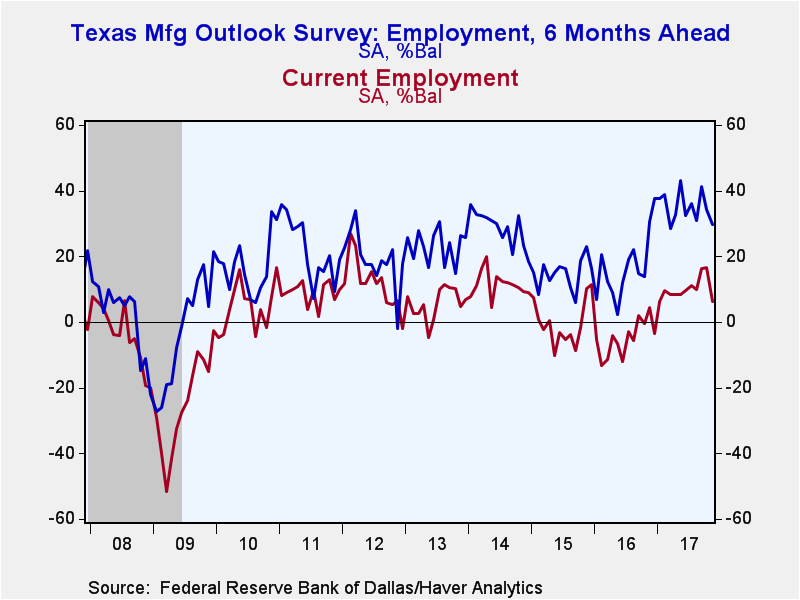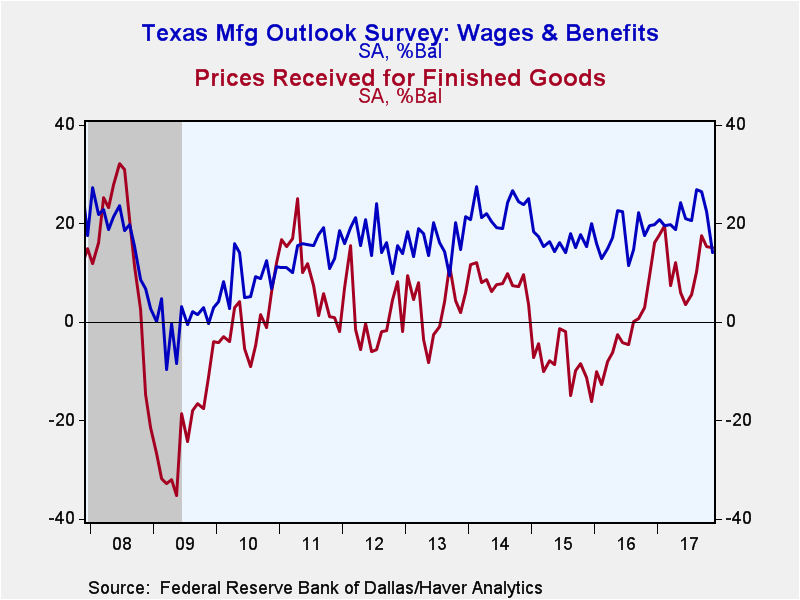 Global| Nov 27 2017
Global| Nov 27 2017Texas Factory Index Backpedals
by:Tom Moeller
|in:Economy in Brief
Summary
The Federal Reserve Bank of Dallas indicated in its Texas Manufacturing Outlook Survey that the November General Business Activity Index fell to 19.4, the lowest point in three months. Despite the decline, the figure still suggested [...]
The Federal Reserve Bank of Dallas indicated in its Texas Manufacturing Outlook Survey that the November General Business Activity Index fell to 19.4, the lowest point in three months. Despite the decline, the figure still suggested firm growth in the factory sector. The production index declined to the lowest level since June but growth in new orders strengthened. The shipments and the inventories measures both fell. The jobs index weakened to the lowest level since January and the workweek series also fell.
Finished goods prices received held steady m/m and remained solid, mirroring the raw material prices measure. Both were up sharply versus earlier lows. The wages & benefits measure plummeted versus its August high to the lowest level since July of last year.
The index of expected business conditions in six months improved to the highest level since the beginning of the year. Expected new orders improved and expected production remained firm. Working the other way, the future employment index fell after moving sideways all year. The measure of expected wages & benefits increased to the highest level since March 2014.
Each index is calculated by subtracting the percentage reporting a decrease from the percentage reporting an increase. When all firms report that activity has increased, an index will register 100. An index will register -100 when all firms report a decrease. An index will be zero when the number of firms reporting an increase or decrease is equal. Items may not add up to 100% because of rounding. Data for the Texas Manufacturing Outlook can be found in Haver's SURVEYS database.
| Texas Manufacturing Outlook Survey (SA, % Balance) | Nov | Oct | Sep | Nov'16 | 2016 | 2015 | 2014 |
|---|---|---|---|---|---|---|---|
| Current General Business Activity Index | 19.4 | 27.6 | 21.3 | 12.5 | -8.8 | -12.5 | 8.4 |
| Production | 15.1 | 25.6 | 19.5 | 9.8 | 2.4 | -1.0 | 14.5 |
| Growth Rate of New Orders | 18.1 | 12.3 | 9.7 | 1.6 | -7.3 | -11.8 | 4.7 |
| Number of Employees | 6.3 | 16.7 | 16.3 | 4.5 | -4.9 | -0.4 | 11.5 |
| Wages & Benefits | 14.2 | 22.5 | 26.4 | 19.5 | 17.6 | 16.5 | 22.9 |
| Prices Received for Finished Goods | 15.1 | 15.3 | 17.5 | 9.5 | -1.6 | -8.5 | 8.3 |
| General Business Activity Index Expected in Six Months | 39.0 | 38.5 | 34.5 | 34.2 | 8.9 | 4.1 | 17.4 |
| Production | 46.1 | 46.0 | 46.5 | 51.9 | 35.8 | 31.1 | 42.7 |
| Growth Rate of New Orders | 40.9 | 36.7 | 35.8 | 42.8 | 24.3 | 20.7 | 31.5 |
| Number of Employees | 29.8 | 34.2 | 41.3 | 30.6 | 16.7 | 14.7 | 28.6 |
| Wages & Benefits | 46.6 | 36.9 | 39.8 | 41.0 | 34.8 | 33.2 | 43.1 |
Tom Moeller
AuthorMore in Author Profile »Prior to joining Haver Analytics in 2000, Mr. Moeller worked as the Economist at Chancellor Capital Management from 1985 to 1999. There, he developed comprehensive economic forecasts and interpreted economic data for equity and fixed income portfolio managers. Also at Chancellor, Mr. Moeller worked as an equity analyst and was responsible for researching and rating companies in the economically sensitive automobile and housing industries for investment in Chancellor’s equity portfolio. Prior to joining Chancellor, Mr. Moeller was an Economist at Citibank from 1979 to 1984. He also analyzed pricing behavior in the metals industry for the Council on Wage and Price Stability in Washington, D.C. In 1999, Mr. Moeller received the award for most accurate forecast from the Forecasters' Club of New York. From 1990 to 1992 he was President of the New York Association for Business Economists. Mr. Moeller earned an M.B.A. in Finance from Fordham University, where he graduated in 1987. He holds a Bachelor of Arts in Economics from George Washington University.
More Economy in Brief
 Global| Feb 05 2026
Global| Feb 05 2026Charts of the Week: Balanced Policy, Resilient Data and AI Narratives
by:Andrew Cates










